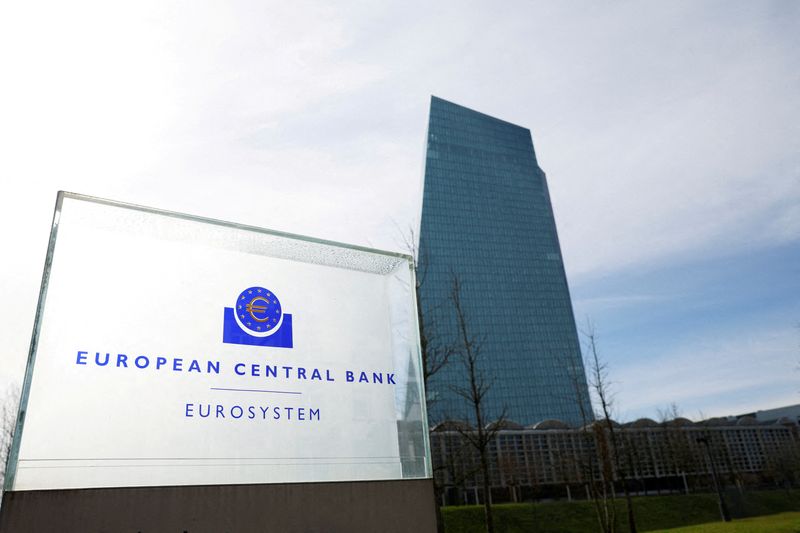Investing.com’s stocks of the week
By Francesco Canepa
FRANKFURT (Reuters) - European Central Bank policymakers are reviewing the interest the bank pays on government cash deposits, including a potential cut, to try and rein in mounting losses resulting from its fight against inflation, two sources told Reuters.
The ECB and the 20 central banks of the countries that share the euro have started reporting large losses after raising interest rates on deposits to a record high in a bid to curb lending and price growth in the euro zone.
Looking to reduce those interest payments, the euro zone's central bankers revived a debate on the remuneration of government deposits at their policy meeting last Thursday, the two sources close to the matter said.
But they put off any decision after last week's preliminary discussion, fearing any change might backfire, the sources added.
Governors worry that slashing the interest they pay on public cash would simply cause governments to switch to commercial banks, which would then park that money back at the ECB for even higher remuneration, according to the sources.
An ECB spokesperson declined to comment.
Policymakers will likely revisit the topic next year, the sources said, when the ECB is also due to tackle the broader issue of the excess cash sloshing around the banking system.
The ECB earlier this year set a ceiling on the remuneration on deposits held by governments at euro zone central banks to equal the Euro Short-Term Rate (€STR), currently at 3.9%, minus 20 basis points.
The Bundesbank, traditionally a magnet for public funds due to Germany's perceived safety, and some others of the euro zone's national central banks have already lowered their own rates to zero.
Governments have in the meantime whittled down their deposits at central banks in the bloc from 647 billion euros ($683 billion) in July 2022 to 205 billion euros at the latest count.
FINANCING STATES?
Traditionally governments did not earn any interest on their cash balances at the central bank, in line with an ECB ban on financing public coffers.
But years of ECB purchases of government bonds and the more recent surge in interest rates have complicated that picture.
The ECB pushed its rate on commercial banks' deposits above zero in September 2022.
Fearing "an abrupt outflow" of public cash into the money market, which had been deprived of vital collateral by the ECB's own bond purchases, the central bank started remunerating government deposits too.
The issue may now turn out to be political as well as financial. Commercial banks have seen their profits soar thanks to the ECB's high interest rates, attracting public criticism and even taxes from governments in Lithuania, Spain and Italy.
Euro zone governments have only enjoyed part of that bonanza but may foot the full bill if their central bank needs a bailout, as the Dutch National Bank warned it might one day.
Euro zone commercial banks earn 4.0% on the excess cash they park at their central bank, which is a whopping 3.5 trillion euros after the ECB flooded the system with money over the past decade, when it was trying to boost too-low inflation via massive bond purchases.
On the other hand, governments enjoyed rich dividends from their central banks in recent years from the proceeds of those same purchases.
ECB President Christine Lagarde said last week the central bank does "not have as a purpose to show profits or to cover losses", adding policymakers had not discussed raising the share of banks' unremunerated reserves.
But the issue is plaguing central banks across rich countries. The Swiss National Bank decided on Monday to reduce the amount of interest it pays commercial banks and the Federal Reserve and Bank of England are also posting losses.
($1 = 0.9472 euros)
